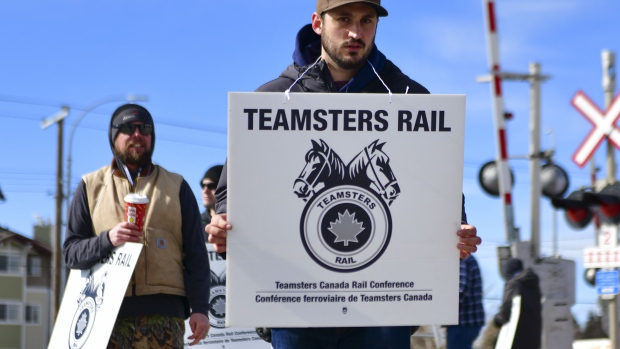Jun 14, 2022
Unions Start to Secure Higher Wages in Canada as Inflation Soars
, Bloomberg News

(Bloomberg) -- Canadian labor unions are beginning to win some of the biggest pay raises in more than a decade, though wage gains are still falling short of compensating workers for soaring inflation.
The average annual increase of seven major union wage settlements in March and April was 3.1%, according to government data. That’s almost double the average pace of pay increases between March 2020 and January 2022.
The last time wage gains were sustainably above 3% was in 2008, and anecdotal evidence suggests unions are only getting started. The Public Service Alliance of Canada, which represents 120,000 workers or about a third of federal employees, is demanding a pay increase of 4.5% per year in negotiations that have hit an impasse.
With annual inflation on track to top 7% -- a four-decade high -- any escalation of wage expectations in collective bargaining will be closely monitored by policy makers. Canada has a relatively high unionization rate, at about 30% of employees versus about 10% in the US.
As workers seek to make up for lost purchasing power, economists worry the inflation shock will lead to higher salary demands that become entrenched through automatic cost-of-living adjustments, starting a wage-price spiral. That would complicate the Bank of Canada’s efforts bring inflation under control.
“We’ve been used to collective negotiations producing 1.5% to 2% annual increases since the 1990s. A 2% annual increase in the collective agreement was considered a win. Now a 2% increase is actually a pay cut for workers,” said Stephanie Ross, director of the school of labor studies at McMaster University in Hamilton, Ontario.
With the cost of living rising sharply, organized labor is flexing its muscle around the world. The US is seeing unionization pushes at major companies like Amazon.com Inc., Starbucks Corp. and Apple Inc. Negotiated pay increases are also accelerating in Europe.
In Canada, the drum-tight labor market -- job vacancies are at a record high 1 million, while the unemployment rate has fallen to 5.1%, a record low -- has increased bargaining power.
Teamsters Canada secured wage increases last month that range from 9% to 25% for warehouse workers of grocer Metro Inc. in Ottawa. Last month, crane and heavy equipment operators went on strike and successfully pushed for a hourly wage increase of C$3 ($2.36) per year until 2025.
Perhaps no negotiation is more important than the federal workers, given the potential to set precedent across organized labor. The Canadian government has dug in its heels, offering a raise averaging 1.7% annually through 2025. The union hit back and filed for conciliation with the labor board, a process that could take several months.
Trickle-Down Effect
Treasury Board President Mona Fortier told reporters last month that it’s “difficult” to meet the union’s wage demand and that the government wants to continue negotiations to reach “a compromise to make sure that we have the best deal for public servants but also value for Canadian taxpayers.”
But the union is “not going to be able to move off very far” from the 4.5% demand, PSAC National President Chris Aylward said in an interview, adding that it’s a “fair and decent” increase given inflation. The union has started mobilizing its members to prepare for a strike vote in the fall, he said.
“We have to start offering workers a higher wage,” Aylward said. “Whatever happens at the federal level usually trickles down into provincial, territorial and private sector” unions.
Apart from wage demands, the union is pushing for continued flexibility on remote work and other workplace inclusivity programs. A number of factors are boosting PSAC’s confidence at the bargaining table.
Prime Minister Justin Trudeau’s Liberals have struck a power-sharing deal with the labor-friendly New Democratic Party. Government coffers are full, thanks to higher nominal economic growth and energy prices. A worker shortage is causing mayhem at the country’s busiest airport and becoming a political headache.
“There’ll be some intense pressure to try and reach a freely negotiated collective agreement,” said Robert Hickey, a professor of labor relations at Queen’s University in Kingston, Ontario. “A labor disruption would have significant reputational effects on the Liberals as well as their NDP partners.”
©2022 Bloomberg L.P.


